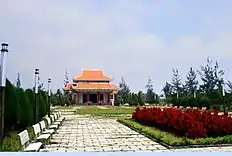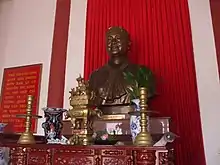Nguyễn Thị Định
Madame Nguyễn Thị Định (15 March 1920 – 26 August 1992) was the first female general of Vietnam People's Army during the Vietnam War. Her role in the war was as National Liberation Front deputy commander, and was described as "the most important Southern woman revolutionary in the war".[1] Furthermore, she was commander of an all-female force known as the Long-Haired Army, whom engaged in espionage and combat against ARVN and US Forces.[2]

Nguyễn Thị Định | |
|---|---|
 | |
| Vice President of Vietnam | |
| In office 19 April 1987 – 19 July 1992 | |
| Preceded by | Lê Quang Đạo |
| Succeeded by | Nguyễn Thị Bình |
| Personal details | |
| Born | 15 March 1920 |
| Died | 26 August 1992 |
| Political party | |
| Awards | Hero of the People's Armed Forces Lenin Peace Prize |
| Military service | |
| Allegiance | |
| Branch/service | |
| Years of service | 1965-1975 |
| Rank | |
| Commands | Deputy Commander of the People's Liberation Armed Forces of South Vietnam |
Nguyễn Thị Định was born from a peasant family in Bến Tre Province, and fought with the Viet Minh forces against the French. She was arrested and incarcerated by the French colonial authority between 1940–43, and helped lead an insurrection in Bến Tre in 1945, and again in 1960 (against the government of Ngô Đình Diệm). In that period, she lost her first husband and child while incarcerated by French authorities.[3] She was a founding member of the National Liberation Front (NLF). In 1965 she was elected chairwoman of the South Vietnam Women's Liberation Association, whom were given the name the "long-haired warriors" by Ho Chi Minh.[4] A portion of membership in the National Liberation Front continued to be women, and many were drawn to the promise of changes in the role of women in society.[4]
After the Vietnam War and the reunification of Vietnam, Madame Định served on the Central Committee of the Vietnamese Communist Party and also became the first female major general to serve in the Vietnam People's Army. She was also one of the Deputy Chairmen of the Council of State from 1987 until her death. Together with Madame Nguyễn Thị Bình, she is one of the two most prominent female Vietnamese communist leaders. She was awarded the Lenin Peace Prize for 1967. In 1995, she was posthumously awarded the title Hero of the People's Armed Forces.
Her memoirs were translated and published by Cornell University Press in 1976.[5] Nguyen Thi Dinh was interviewed by Stanley Karnow for Vietnam: A Television History documentary.[3] She contributed the piece "The braided army" to the 1984 anthology Sisterhood Is Global: The International Women's Movement Anthology, edited by Robin Morgan.[6]

References
- "Who Was Nguyen Thi Dinh?". facultystaff.richmond.edu. Archived from the original on 2012-01-06. Retrieved 2018-05-31.
- and, Wolfgang Saxon. "Nguyen Thi Dinh, the Senior Woman In Vietcong Ranks". Retrieved 2018-05-31.
- "Vietnam: A Television History; Interview with Nguyen Thi Dinh, 1981". openvault.wgbh.org. Retrieved 2018-05-31.
- Anderson, David L. (2010-11-26). The Columbia History of the Vietnam War. Columbia University Press. ISBN 9780231509329.
- Nguyễn, Thị Định (1976). No Other Road to Take: Memoir of Mrs. Nguyẽ̂n Thị Định. SEAP Publications. ISBN 9780877271024.
- "Table of Contents: Sisterhood is global". Catalog.vsc.edu. Archived from the original on 2015-12-08. Retrieved 2015-10-15.
| Political offices | ||
|---|---|---|
| Preceded by Lê Thanh Nghị Chu Huy Mân |
Vice President of Vietnam 1987–1992 |
Succeeded by Nguyễn Thị Bình |